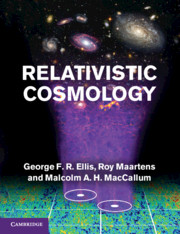Book contents
- Frontmatter
- Contents
- Preface
- Part 1 Foundations
- 1 The nature of cosmology
- 2 Geometry
- 3 Classical physics and gravity
- Part 2 Relativistic cosmological models
- Part 3 The standard model and extensions
- Part 4 Anisotropic and inhomogeneous models
- Part 5 Broader perspectives
- Appendix: Some useful formulae
- References
- Index
1 - The nature of cosmology
from Part 1 - Foundations
Published online by Cambridge University Press: 05 April 2012
- Frontmatter
- Contents
- Preface
- Part 1 Foundations
- 1 The nature of cosmology
- 2 Geometry
- 3 Classical physics and gravity
- Part 2 Relativistic cosmological models
- Part 3 The standard model and extensions
- Part 4 Anisotropic and inhomogeneous models
- Part 5 Broader perspectives
- Appendix: Some useful formulae
- References
- Index
Summary
The aims of cosmology
The physical universe is the maximal set of physical objects which are locally causally connected to each other and to the region of spacetime that is accessible to us by astronomical observation. The scientific theory of cosmology is concerned with the study of the largescale structure of the observable region of the universe, and its relation to local physics on the one hand and to the rest of the universe on the other.
Thus cosmology deals with the distribution and motion of radiation and of galaxies, clusters of galaxies, radio sources, quasi-stellar objects, and other astronomical objects observable at large distances, and so – in response to the astronomical observations – contemplates the nature and history of the expanding universe. Following the evolution of matter back into the past, this inevitably leads to consideration of physical processes in the hot early universe (the ‘Hot Big Bang’, or HBB), and even contemplation of the origin of the universe itself. Such studies underlie our current–still incomplete–understanding of the origin of galaxies, and in particular of our own Galaxy, which is the environment in which the Solar System and the Earth developed. Hence, as well as providing an observationally based analysis of what we can see in distant regions and how it got to be as it is, cosmology provides important information on the environment in which life–including ourselves—could come to exist in the universe, and so sets the background against which any philosophy of life in the universe must be set.
- Type
- Chapter
- Information
- Relativistic Cosmology , pp. 3 - 24Publisher: Cambridge University PressPrint publication year: 2012

